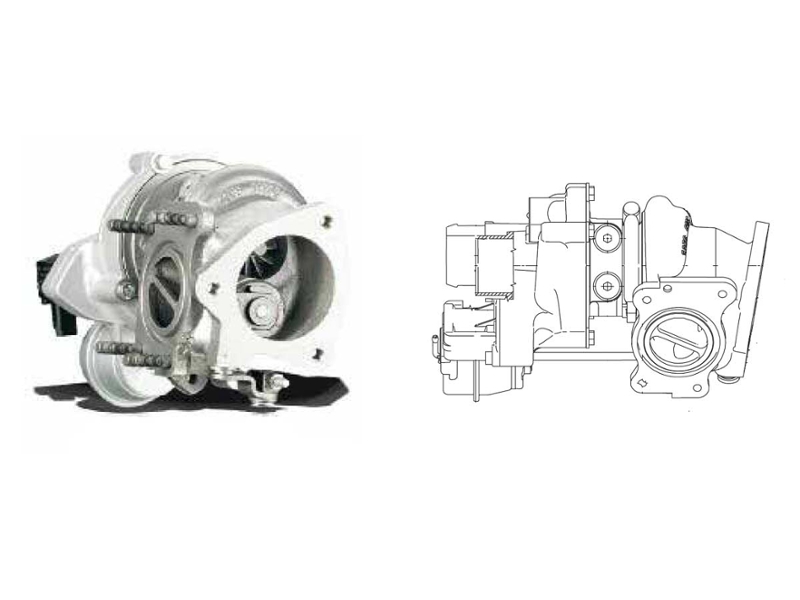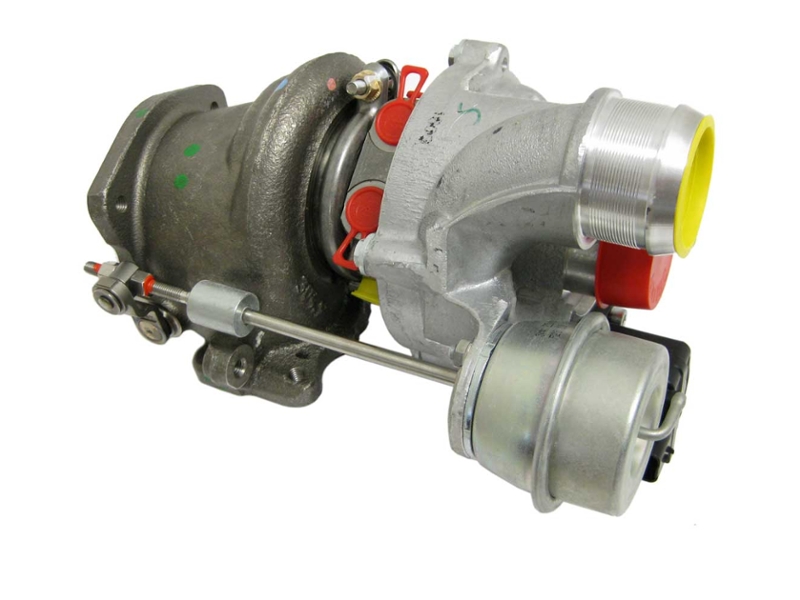

Fits the following Cooper S models with the N18 engine:
2011-2013 R56 MINI Cooper S Hardtop
2011-2014 R55 MINI Cooper S Clubman
2011-2015 R57 MINI Cooper S Convertible
2012-2015 R58 MINI Cooper S Coupe
2012-2015 R59 MINI Cooper S Roadster
2011-2016 R60 MINI Cooper S Countryman
2013-2016 R60 MINI Cooper S Paceman
See the Turbo Application Guide to see all the options for replacement and upgraded Turbo's.
For Turbo related replacement hardware, see our Mini Cooper Turbo Installation Hardware Application Guide.
OTHER PARTS TO CONSIDER
Gaskets, seals, studs, and other hardware are NOT included. If you need to replace these items, order separately.
See our Turbo Install Kit. This kit includes all the most commonly replaced gaskets and seals, plus a new oil supply line. Additional gaskets, seals and other hardware may be required depending on the installation.
When servicing the Turbo on the MINI, it is very important (maybe even critical) that you replace the Turbo Oil Supply line to avoid potential future turbo issues. (Included in the Turbo Install Kit).
Over time, the turbo and turbo supply line builds a fine layer of 'coked' or cooked oil on the internal surfaces. When you remove the supply line from the turbo, this disrupts the continuity of the coked layer with great potential of some of the coking to flake free. These coked oil particles can easily clog the fine journals that feed oil to the turbo bearings. Once the the oil flow is compromised, it is only a matter of time for cascading failures that can damage the turbo and catalytic converter! Don't take a chance - REPLACE the Oil Supply Line ! ! !
For additional protection, take a look at the Turbo Oil Supply Line Thermal Wrap.
For other TURBOCHARGER related products, see our TURBOCHARGER products page.
OUR ADVICE ON DRIVING A TURBOCHARGED MINI
We STRONGLY recommend you change the motor oil more frequently than the factory recommendation. Anecdotal evidence suggests Turbo's with more frequent oil changes have fewer issues. We suggest 5000 mile oil change interval or less. Make sure you use FULL SYNTHETIC motor oil with the ACEA (Association des Constructeurs Europeens d'Automobiles) A3/B3 specification.
After a long or hard drive, drive 'easy' for a while just before your destination. This will reduce the engine and oil temperatures to lower operating levels. Also make a habit to let the engine idle for a couple minutes before shutting off. This will help cool the turbo preventing oil coking in the journals and bearings. Yes, the MINI has an auxiliary water pump that runs after shutdown to help cool the turbo, BUT - the oil isn't cirulating - it just sits there waiting for the turbo to cool. This is why we recommend you idle before shutdown - let the oil circulate while the temperature comes down.
MANUFACTURER NOTES ON INSTALLATION:
[ ] Always replace the turbo oil supply line with the turbo.
- - - Due to excess heat round the turbocharger and particulates suspended in the turbo supply oil the oil will harden or "coke~ in the turbo and oil supply lines. If the oil supplyline is not replaced with the turbocharger the coked oil will break free from the side walls of the oil supply line and damage the turbocharger bearings. Cleaning the oil line will not help and only aggravate and increase the likelihood of the turbo failure due to coked oil breaking free form the sidewall.
[ ] Always replace the catalytic converter on mini coopers before installing a new turbo.
- - - The Catalytic converter may look clear but if any oil leaked into it some of the holes might be blocked and will cause back pressure. This starts to happen on Mini Coopers at 15k miles! Exhaust back pressure causes premature failure of the turbocharger. Turbochargers are not designed to have pressure on the exhaust side.As an alternative, have your catalytic converter refurbished to restore original flow.
[ ] Always prime the turbocharger.
- - - No oil on the turbocharger bearings will cause failure of the bearings if they are dry even for a short period of time. For maximum protection, see Turbo Additive for Priming New Turbo's
[ ] Always flush oil after a turbocharger change
- - - Most turbochargers fail catastrophically this means that the metal and other items can end up in your oil. Always flush your oil a minimum of 3 times with new oil after an oil change.
LEARN MORE ABOUT TURBOCHARGERS:
Take a look at these informative videos that will help you avoid potential pitfalls with the Turbo:
How to Kill a New Turbo Part 1 - Oil Line
How to Kill a New Turbo Part 2 - Catalytic Converter
How to Kill a New Turbo Part 3 - No or Low Oil
How to Kill a New Turbo Part 4 - Using the Correct Oil
NOTE: The MINI Factory replacement such as this product will pass the California Emissions Visual inspection.
Fits the following Cooper S models with the N18 engine:
2011-2013 R56 MINI Cooper S Hardtop
2011-2014 R55 MINI Cooper S Clubman
2011-2015 R57 MINI Cooper S Convertible
2012-2015 R58 MINI Cooper S Coupe
2012-2015 R59 MINI Cooper S Roadster
2011-2016 R60 MINI Cooper S Countryman
2013-2016 R60 MINI Cooper S Paceman
See the Turbo Application Guide to see all the options for replacement and upgraded Turbo's.
For Turbo related replacement hardware, see our Mini Cooper Turbo Installation Hardware Application Guide.
OTHER PARTS TO CONSIDER
Gaskets, seals, studs, and other hardware are NOT included. If you need to replace these items, order separately.
See our Turbo Install Kit. This kit includes all the most commonly replaced gaskets and seals, plus a new oil supply line. Additional gaskets, seals and other hardware may be required depending on the installation.
When servicing the Turbo on the MINI, it is very important (maybe even critical) that you replace the Turbo Oil Supply line to avoid potential future turbo issues. (Included in the Turbo Install Kit).
Over time, the turbo and turbo supply line builds a fine layer of 'coked' or cooked oil on the internal surfaces. When you remove the supply line from the turbo, this disrupts the continuity of the coked layer with great potential of some of the coking to flake free. These coked oil particles can easily clog the fine journals that feed oil to the turbo bearings. Once the the oil flow is compromised, it is only a matter of time for cascading failures that can damage the turbo and catalytic converter! Don't take a chance - REPLACE the Oil Supply Line ! ! !
For additional protection, take a look at the Turbo Oil Supply Line Thermal Wrap.
For other TURBOCHARGER related products, see our TURBOCHARGER products page.
OUR ADVICE ON DRIVING A TURBOCHARGED MINI
We STRONGLY recommend you change the motor oil more frequently than the factory recommendation. Anecdotal evidence suggests Turbo's with more frequent oil changes have fewer issues. We suggest 5000 mile oil change interval or less. Make sure you use FULL SYNTHETIC motor oil with the ACEA (Association des Constructeurs Europeens d'Automobiles) A3/B3 specification.
After a long or hard drive, drive 'easy' for a while just before your destination. This will reduce the engine and oil temperatures to lower operating levels. Also make a habit to let the engine idle for a couple minutes before shutting off. This will help cool the turbo preventing oil coking in the journals and bearings. Yes, the MINI has an auxiliary water pump that runs after shutdown to help cool the turbo, BUT - the oil isn't cirulating - it just sits there waiting for the turbo to cool. This is why we recommend you idle before shutdown - let the oil circulate while the temperature comes down.
MANUFACTURER NOTES ON INSTALLATION:
[ ] Always replace the turbo oil supply line with the turbo.
- - - Due to excess heat round the turbocharger and particulates suspended in the turbo supply oil the oil will harden or "coke~ in the turbo and oil supply lines. If the oil supplyline is not replaced with the turbocharger the coked oil will break free from the side walls of the oil supply line and damage the turbocharger bearings. Cleaning the oil line will not help and only aggravate and increase the likelihood of the turbo failure due to coked oil breaking free form the sidewall.
[ ] Always replace the catalytic converter on mini coopers before installing a new turbo.
- - - The Catalytic converter may look clear but if any oil leaked into it some of the holes might be blocked and will cause back pressure. This starts to happen on Mini Coopers at 15k miles! Exhaust back pressure causes premature failure of the turbocharger. Turbochargers are not designed to have pressure on the exhaust side.As an alternative, have your catalytic converter refurbished to restore original flow.
[ ] Always prime the turbocharger.
- - - No oil on the turbocharger bearings will cause failure of the bearings if they are dry even for a short period of time. For maximum protection, see Turbo Additive for Priming New Turbo's
[ ] Always flush oil after a turbocharger change
- - - Most turbochargers fail catastrophically this means that the metal and other items can end up in your oil. Always flush your oil a minimum of 3 times with new oil after an oil change.
LEARN MORE ABOUT TURBOCHARGERS:
Take a look at these informative videos that will help you avoid potential pitfalls with the Turbo:
How to Kill a New Turbo Part 1 - Oil Line
How to Kill a New Turbo Part 2 - Catalytic Converter
How to Kill a New Turbo Part 3 - No or Low Oil
How to Kill a New Turbo Part 4 - Using the Correct Oil
NOTE: The MINI Factory replacement such as this product will pass the California Emissions Visual inspection.
-
Price : $179.71
